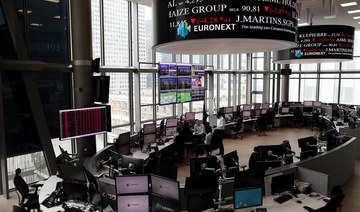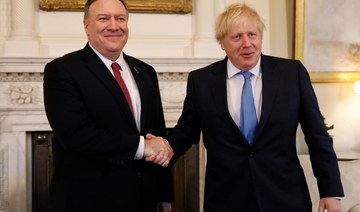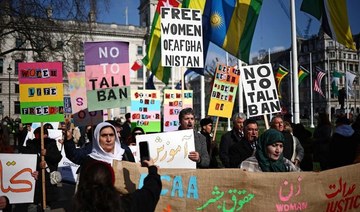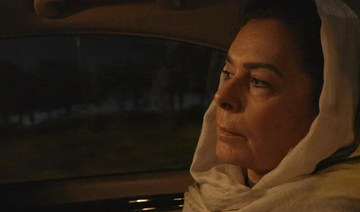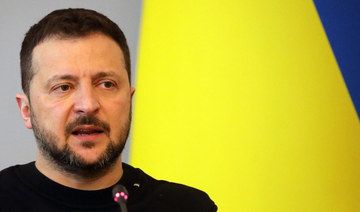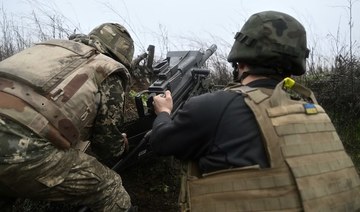LONDON: Britain on Friday ended almost half a century of European Union membership, making a historic exit after years of bitter arguments to chart its own uncertain path in the world.
There were celebrations and tears across the country as the EU’s often reluctant member became the first to leave an organization set up to forge unity among nations after the horrors of World War II.
Thousands of people waving Union Jack flags packed London’s Parliament Square to mark the moment of Brexit at 11 p.m. (2300 GMT) — midnight in Brussels.
“We did it!” declared Nigel Farage, the former member of the European Parliament who has campaigned for Brexit for years, before the crowd began singing the national anthem.
It was a largely good-natured gathering, aside from one Brexit supporter who earlier set an EU flag alight.
But Brexit has exposed deep divisions in British society, and many fear the consequences of ending 47 years of ties with their nearest neighbors.
Some pro-Europeans, including many of the 3.6 million EU citizens who made their lives in Britain, marked the occasion with solemn candlelit vigils.
Brexit has also provoked soul-searching in the EU about its own future after losing 66 million people, a global diplomatic big-hitter and the clout of the City of London financial center.
In an address to the nation, Prime Minister Boris Johnson — a figurehead in the seismic 2016 referendum vote for Brexit — acknowledged there might be “bumps in the road ahead.”
But he said Britain could make it a “stunning success.”
As he held a private party in his Downing Street office, a clock projected on the walls outside counted down the minutes until Brexit.
Johnson predicted a “new era of friendly cooperation” with the EU while Britain takes a greater role on the world stage.
“The most important thing to say tonight is that this is not an end but a beginning,” he said in a televised address.
EU institutions earlier began removing Britain’s red, white and blue flags in Brussels ahead of a divorce that German Chancellor Angela Merkel called a “sea-change” for the bloc.
French President Emmanuel Macron described it as a “historic warning sign” that should force the EU and its remaining nations of more than 440 million people to stop and reflect.
Britain’s departure was sealed in an emotional vote in the EU parliament this week that ended with MEPs singing “Auld Lang Syne,” a traditional Scottish song of farewell.
Almost nothing will change straight away, because of an 11-month transition period negotiated as part of the exit deal.
Britons will be able to work in and trade freely with EU nations until December 31, and vice versa, although the UK will no longer be represented in the bloc’s institutions.
But legally, Britain is out.
And while the divorce terms have been agreed, Britain must still strike a deal on future relations with the EU, its largest trading partner.
Both will set out their negotiating positions Monday.
“We want to have the best possible relationship with the United Kingdom, but it will never be as good as membership,” European Commission president Ursula von der Leyen said in Brussels.
Getting this far has been a traumatic process.
Britain resisted many EU projects over the years, refusing to join the single currency or the Schengen open travel area, and euroskeptics have long complained about Brussels bureaucracy.
Worries about mass migration added further fuel to the Brexit campaign while for some, the 2016 vote was a chance to punish the government for years of cuts to public spending.
But the result was still a huge shock.
It unleashed political chaos, sparking years of toxic arguments that paralyzed parliament and forced the resignations of prime ministers David Cameron and Theresa May.
Johnson brought an end to the turmoil a decisive election victory in December which gave him the parliamentary majority he needed to ratify his Brexit deal.
But Britons remain as divided as they were nearly four years ago, when 52 percent voted to leave and 48 percent voted to remain in the EU.
“Rise and shine... It’s a glorious new Britain” said the Brexit-supporting Daily Express. The i newspaper, in contrast, headlined: “What next?“
In Scotland, where a majority voted to stay in 2016, Brexit has revived calls for independence.
First Minister Nicola Sturgeon tweeted: “Scotland will return to the heart of Europe as an independent country — #LeaveALightOnForScotland.”
In Northern Ireland — soon to be the new EU frontier — there are fears Brexit could destabilize a hard-won peace after decades of conflict over British rule.
Irish foreign minister Simon Coveney tweeted: “Goodbye & good luck.”
Johnson, a polarizing figure accused of glossing over the complexity of leaving the EU, made no public appearance on Friday and avoided any official celebrations that might exacerbate divisions.
He hosted a special cabinet meeting in the northeastern city of Sunderland, which was the first to declare for Brexit in 2016, while Downing Street was lit up in the colors of the Union Jack flag.
Millions of commemorative 50 pence coins have also been issued.
It was a different story in nearby Parliament Square, where the moment of Brexit was met with cheers, the lighting of flares and balloons let off into the night sky.
“What happens now marks the point of no return. Once we have left, we are never, ever going back,” Farage told the crowd of cheering supporters.
At a “Big Brexit Bash” in Morley, northern England, Raymond Stott described the four years since the referendum as “a right cock-up.”
“I am just glad it’s all over. We will look after ourselves. We don’t need Europe,” said the 66-year-old.
Some British expatriates in southern Spain celebrated in bars but for many pro-Europeans, Friday marks a day they hoped would never come.
“Today is a day of mourning,” said Katrina Graham, 31, an Irish women’s rights activist who lives in Brussels, at a protest in central London.
At Berlin’s Brandenburg Gate, a flashmob sang the EU anthem “Ode to Joy,” from Beethoven’s ninth symphony and waved flags.
From Saturday, Britain will be free to strike trade deals around the world, including with the United States.
Johnson has given himself just 11 months to negotiate a new partnership with the EU, covering everything from trade to security cooperation — despite warnings this is not enough time.
He also discussed with his ministers on Friday an aim to get 80 percent of Britain’s commerce covered by free trade agreements within three years, a spokesman said.
US President Donald Trump is an enthusiastic supporter of Brexit, and one of his top envoys on Friday hailed an “exciting new era.”
“We will continue building upon our strong, productive, and prosperous relationship with the UK as they enter this next chapter,” Secretary of State Mike Pompeo said.
New era for divided Britain as it leaves EU
https://arab.news/mz4uc
New era for divided Britain as it leaves EU
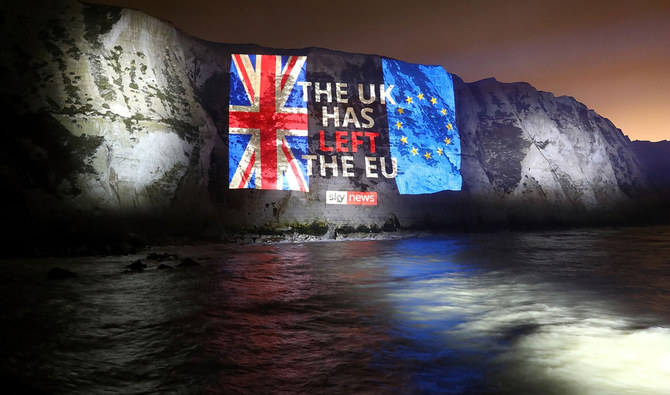
- UK will slip away from bloc an hour before midnight from club it joined in 1973
- At a stroke, the EU will be deprived of 15 percent of its economy, its biggest military spender and the world’s international financial capital of London
A British-Palestinian doctor was denied entry to France for a Senate meeting about the war in Gaza
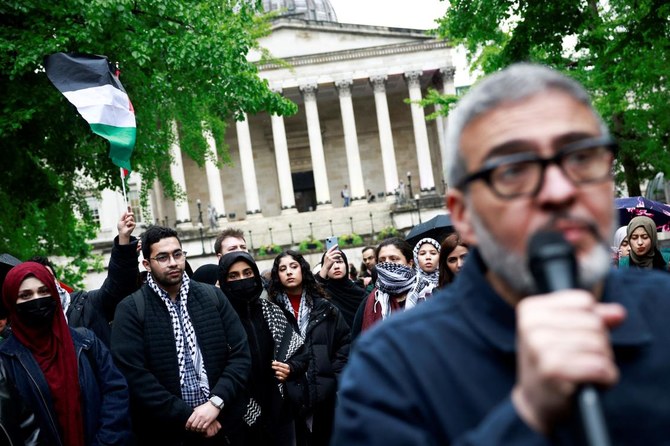
Abu Sitta posted on social networks that he was denied entry in France because of a one-year ban by Germany on his entry to Europe
PARIS: A well-known British-Palestinian surgeon who volunteered in Gaza hospitals said he was denied entry to France on Saturday to speak at a French Senate meeting about the Israel-Hamas war. Authorities wouldn’t give a reason for the decision.
Dr. Ghassan Abu Sitta was placed in a holding zone in the Charles de Gaulle airport and will be expelled, according to French Sen. Raymonde Poncet Monge, who had invited him to speak at the Senate.
‘’It’s a disgrace,’’ she posted on X.
Abu Sitta posted on social networks that he was denied entry in France because of a one-year ban by Germany on his entry to Europe. Germany denied him entry last month, and France and Germany are part of Europe’s border-free Schengen zone. He posted Saturday that he was being sent back to London.
The French Foreign Ministry, Interior Ministry, local police and the Paris airport authority would not comment on what happened or give an explanation.
Abu Sitta had been invited by France’s left-wing Ecologists group in the Senate to speak at a colloquium Saturday about the situation in Gaza, according to the Senate press service. The gathering included testimony from medics, journalists and international legal experts with Gaza-related experience.
Last month Abu Sitta was denied entry to Germany to take part in a pro-Palestinian conference. He said he was stopped at passport control, held for several hours and then told he had to return to the UK He said airport police told him he was refused entry due to “the safety of the people at the conference and public order.”
Abu Sitta, who recently volunteered with Doctors Without Borders in Gaza, has worked during multiple conflicts in the Palestinian territories, beginning in the late 1980s during the first Palestinian uprising. He has also worked in other conflict zones, including in Iraq, Syria and Yemen.
France has seen tensions related to the Mideast conflict almost daily since the deadly Oct. 7 Hamas incursion into Israel. In recent days and weeks police have cleared out students at French campuses holding demonstrations and sit-ins similar to those in the United States.
Afghanistan’s only female diplomat resigns in India after gold smuggling allegations
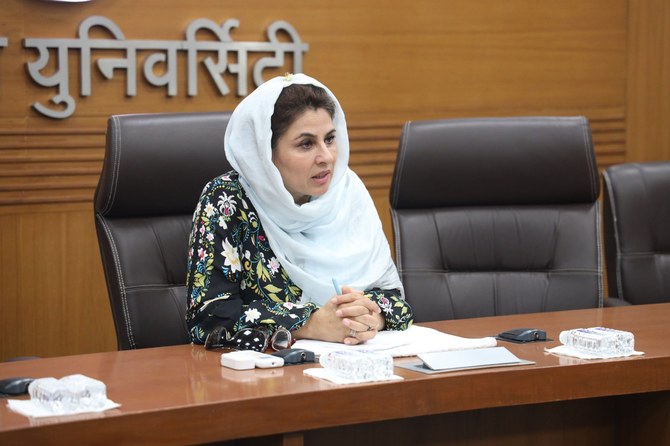
- Zakia Wardak, the Afghan consul-general for Mumbai, announced her resignation on her official account on the social media platform X
- According to Indian media reports, she has not been arrested because of her diplomatic immunity
ISLAMABAD: Afghanistan’s diplomat in India, who was appointed before the Taliban seized power in 2021 and said she was the only woman in the country’s diplomatic service, has resigned after reports emerged of her being detained for allegedly smuggling gold.
Zakia Wardak, the Afghan consul-general for Mumbai, announced her resignation on her official account on the social media platform X on Saturday after Indian media reported last week that she was briefly detained at the city’s airport on allegations of smuggling 25 bricks of gold, each weighing 1 kilogram (2.2 pounds), from Dubai.
According to Indian media reports, she has not been arrested because of her diplomatic immunity.
In a statement, Wardak made no mention of her reported detention or gold smuggling allegations but said, “I am deeply sorry that as the only woman present in Afghanistan’s diplomatic apparatus, instead of receiving constructive support to maintain this position, I faced waves of organized attacks aimed at destroying me.”
“Over the past year, I have encountered numerous personal attacks and defamation not only directed toward myself but also toward her close family and extended relatives,” she added.
Wardak said the attacks have “severely impacted my ability to effectively operate in my role and have demonstrated the challenges faced by women in Afghan society.”
The Taliban Foreign Ministry did not immediately return calls for comment on Wardak’s resignation. It wasn’t immediately possible to confirm whether she was the country’s only female diplomat.
She was appointed consul-general of Afghanistan in Mumbai during the former government and was the first Afghan female diplomat to collaborate with the Taliban.
The Taliban — who took over Afghanistan in 2021 during the final weeks of US and NATO withdrawal from the country — have barred women from most areas of public life and stopped girls from going to school beyond the sixth grade as part of harsh measures they imposed despite initial promises of a more moderate rule.
They are also restricting women’s access to work, travel and health care if they are unmarried or don’t have a male guardian, and arresting those who don’t comply with the Taliban’s interpretation of hijab, or Islamic headscarf.
Russia puts Ukraine's Zelensky on wanted list, TASS reports

- Russia has issued arrest warrants for a number of Ukrainian and other European politicians
MOSCOW: Russia has opened a criminal case against Ukrainian President Volodymyr Zelensky and put him on a wanted list, the state news agency TASS reported on Saturday, citing the Interior Ministry's database.
The entry it cited gave no further details.
Russia has issued arrest warrants for a number of Ukrainian and other European politicians since the start of the conflict with Ukraine in February 2022.
Russian police in February put Estonian Prime Minister Kaja Kallas, Lithuania's culture minister and members of the previous Latvian parliament on a wanted list for destroying Soviet-era monuments.
Russia also issued an arrest warrant for the International Criminal Court (ICC) prosecutor who last year prepared a warrant for President Vladimir Putin on war crimes charges.
A Chinese driver is praised for helping reduce casualties in a highway collapse that killed 48
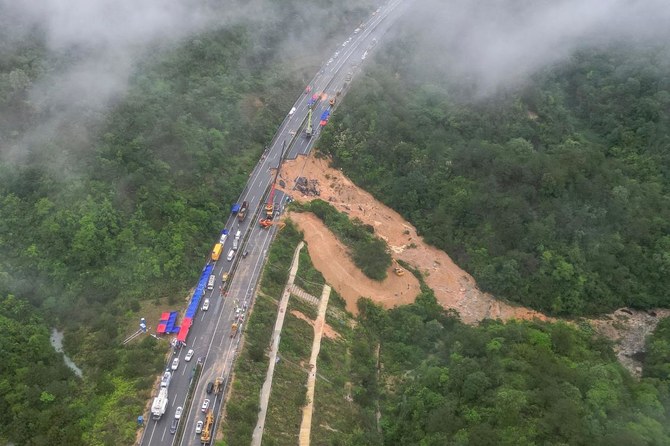
- Reacting swiftly, Wang, a former soldier, positioned his truck to block the highway, effectively stopping dozens of vehicles from advancing into danger
- His wife got out of the truck to alert other drivers about the situation
BEIJING: A Chinese truck driver was praised in local media Saturday for parking his vehicle across a highway and preventing more cars from tumbling down a slope after a section of the road in the country’s mountainous south collapsed and killed at least 48 people.
Wang Xiangnan was driving Wednesday along the highway in Guangdong province, a vital economic hub in southern China. At around 2 a.m., Wang saw several vehicles moving in the opposite direction of the four-lane highway and a fellow driver soon informed him about the collapse, local media reported.
Reacting swiftly, Wang, a former soldier, positioned his truck to block the highway, effectively stopping dozens of vehicles from advancing into danger, Jiupai News quoted Wang as saying. Meanwhile, his wife got out of the truck to alert other drivers about the situation, it said.
“I didn’t think too much. I just wanted to stop the vehicles,” Wang told the Chinese news outlet.
Wang’s courageous actions not only garnered praise from Chinese social media users but also recognition from the China Worker Development Foundation.
The foundation announced Friday that in partnership with a car company it had awarded Wang 10,000 yuan ($1,414). A charity project linked to tech giant Alibaba Group Holding also gave an equal amount to Wang, newspaper Dahe Daily reported. Wang told the newspaper he would donate the money to the families of the collapse victims.
Local media also reported that another man had knelt down to prevent cars from proceeding on the highway.
The accident came after a month of heavy rains in Guangdong. Some of the 23 vehicles that plunged into the deep ravine burst in flames, sending up thick clouds of smoke.
About 30 people were hospitalized. On Saturday, one was discharged from the hospital, state broadcaster CCTV reported. The others were improving, but one remains in serious condition.
On Saturday, the Meizhou city government in Guangdong said in a statement that authorities would conduct citywide checks on expressways, railways and roads in mountainous areas. A team led by the provincial governor is investigating the cause of the collapse, Southcn.com reported.
The Chinese government had sent a vice premier to oversee recovery efforts and urged better safety measures following calls by President Xi Jinping and the Communist Party’s No. 2 official, Premier Li Qiang, to swiftly handle the tragedy.
The dispatch of Zhang Guoqing, who is also a member of one of the ruling Communist Party’s leading bodies, illustrates the concern over a possible public backlash over the disaster, the latest in a series of deadly infrastructure failures.
Russia says it shot down four US-made long range missiles over Crimea

- The ATACMS missiles, with a range up to 300km were used for the first time in the early hours of April 17
MOSCOW: The Russian defense ministry said on Saturday its air defense forces shot down four US-produced long-range missiles over the Crimea peninsular, weapons known as Army Tactical Missile Systems (ATACMS) that Washington has shipped to Ukraine in recent weeks.
The ministry said later that Russian aircraft and air defense systems had downed a total of 15 ATACMS in the past week.
On Tuesday, Russian officials said Ukraine had attacked Crimea with ATACMS in an attempt to pierce Russian air defenses of the annexed peninsula but that six had been shot down.
A US official said in Washington last month that the United States secretly shipped long-range missiles to Ukraine in recent weeks.
The ATACMS missiles, with a range up to 300km were used for the first time in the early hours of April 17, launched against a Russian airfield in Crimea that was about 165 km (103 miles) from the Ukrainian front lines, the official said.
The Pentagon initially opposed the long-range missile deployment, concerned that taking the missiles from the American stockpile would hurt US military readiness.
There were also concerns that Ukraine would use them to attack targets deep inside Russia, a step which could lead to an escalation of the war toward a direct confrontation between Russia and the United States.
Separately on Saturday, the Russian defense ministry said that in the last week its forces had destroyed a military train carrying equipment and arms produced in the West and supplied to Ukraine by NATO.
The scale of the damage, exact date and location were not disclosed.
Reuters is not immediately able to corroborate battlefield accounts from either side.
On Thursday, British Foreign Secretary David Cameron promised 3 billion pounds ($3.7 billion) of annual military aid for Ukraine for “as long as it takes,” adding that London had no objection to its weapons being used inside Russia, drawing a strong rebuke from Moscow.



